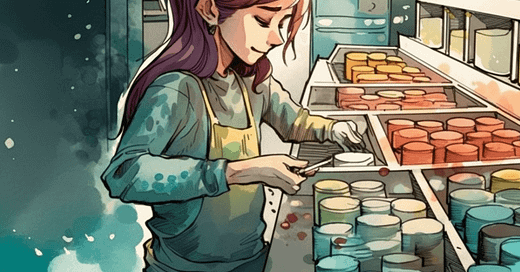What does Love the Process even mean?
Let's peel back the layers of this worn-out phrase and get real with it.
Ah, that ever-present platitude, so often uttered that it feels as if it's lost its essence. Alongside clichés like "think outside the box" and "win-win situation," these phrases pass through our ears, barely registering as meaningful or relevant.
To infuse some fresh meaning into this tired expression, let's dissect "love the process" and make it tangible, using a brief personal story as our guide. But first, let's make sure we're on the same page: Loving the process means truly embracing it, allowing the desired outcomes to emerge organically.
Simple as it sounds, actually living this mantra can prove elusive. So, let's clarify what loving the process is not:
It doesn't mean adoring every single aspect of your process. Chances are, you won't be head over heels for every task.
It's not about coercing yourself into loving what you're doing. Love can't be forced.
It doesn't involve turning a blind eye to the less pleasant parts of your process or tasks.
With that in mind, let's delve into a personal example of loving the process.
When you're fully immersed in work that genuinely captivates you—perhaps even love—it becomes your driving force. For me, that force is exploring ideas within my current interests and weaving them into a cohesive narrative, often expressed visually or textually.
However, the act of translating these ideas into something accessible to others demands extra effort. To share my viewpoint with those of differing backgrounds, I must craft a gripping story or illustration. This involves outlining, writing, finding examples and visuals, and ultimately, hitting "publish."
Naturally, I find some tasks more pleasurable than others. But I still tackle the less alluring aspects of the process because sharing my discoveries brings me joy. Sometimes, I might choose not to publish if I think it won't add value (indeed, sidestepping over-optimization can help maintain that spark in the process).
Although certain tasks might not be as gratifying as the exploratory work, they're still vital to the whole process. By honing my focus on creating a body of work that is both aesthetically appealing and captivating for the right audience, I find satisfaction in the entire process.
In summary, learning to love the process means embracing both the delightful and the daunting aspects of your work and recognizing that each element plays a part in the final product. By tying this abstract concept to real-life experiences, we can rekindle its meaning and motivate ourselves to authentically love the process.
So, what does your (creative) process entail? Which parts do you find most enjoyable?
Cheers,
Jibran




